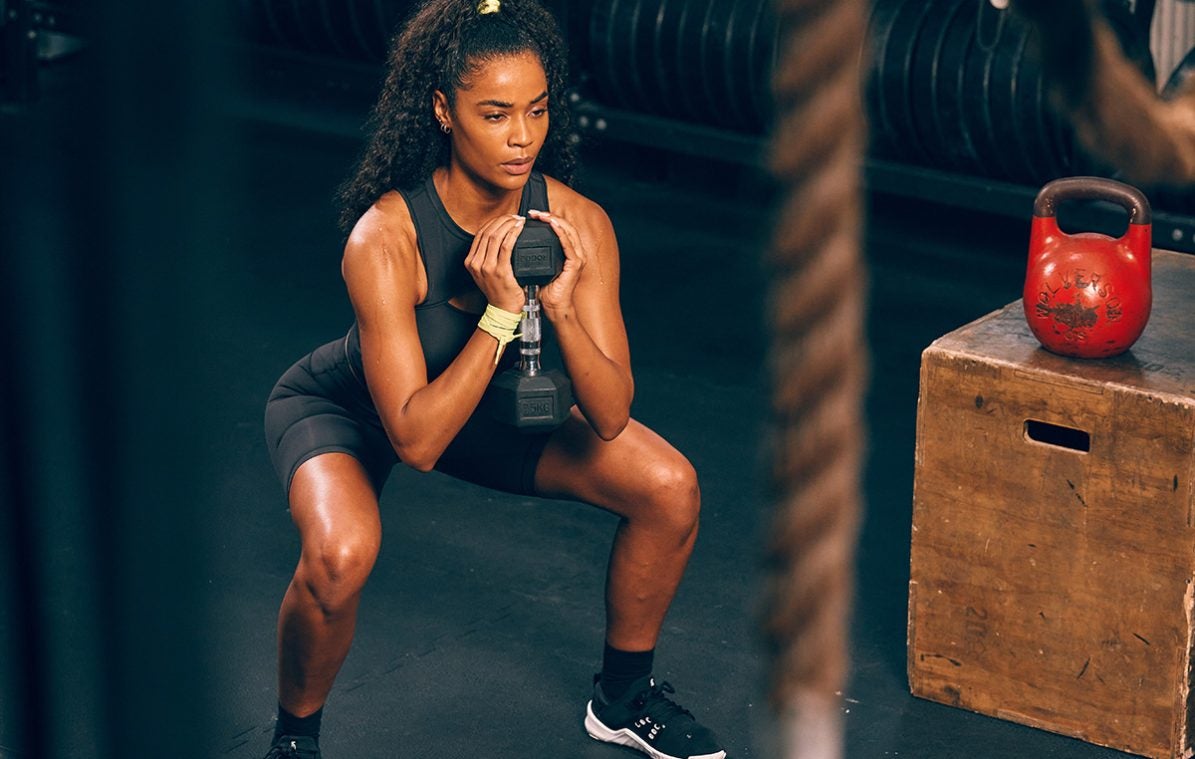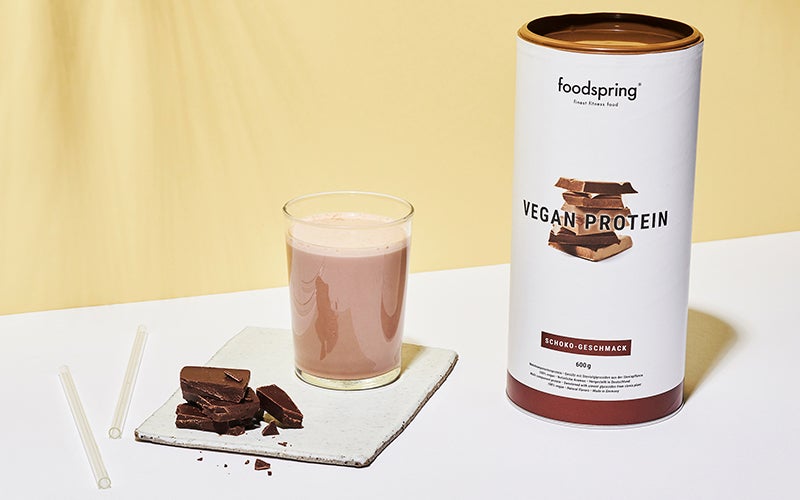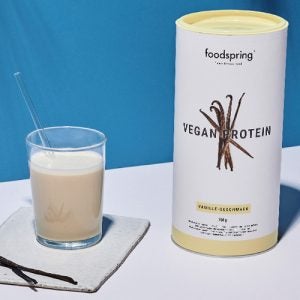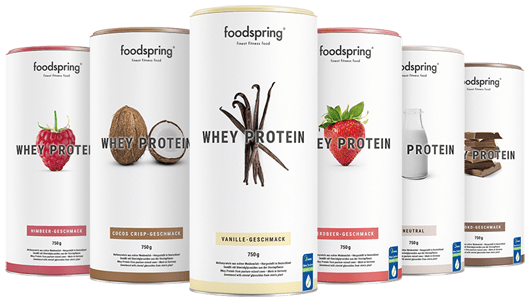Protein Powder for all your goals
 © foodspring
© foodspring
Protein powder is the easiest way to provide your body with high-quality proteins in a concentrated form.
We’ll show you how you can benefit from taking protein powder and how to identify high-quality protein powders.
We’ll suggest protein powders that are ideal for muscle building and for losing weight and explain the differences between them.
The benefits of protein powders
In addition to weight and endurance training, the key to a strong and beautiful body is a sufficient intake of protein.
Proteins are the building blocks for our muscles. But not only that, they also have an effect on our skin and hair.
- Suitable for muscle building
- Helps prevent cravings
- Easy to combine with other ingredients
- Can be used for baking
Protein is easy to integrate into everyday life in the form of protein shakes: a quick and easy way to help cover the demands of a high-protein diet.
And it’s not only men that can benefit from using protein shakes. Protein shakes are suitable for women, too.1
The quality of protein powders
The market for protein powders is huge. And for the consumer it is often difficult to recognise good quality.
We want to make the market more transparent and provide you with criteria that will help you identify “high-quality” protein powders.
Protein powder for muscle building
In addition to weight training and an appropriate diet, protein powder is key to building muscle.
The need for protein increases with the intensity of the workout and your physical constitution (size, weight, age, etc.).
If you’re looking to build muscle, a sufficient intake of protein is required to enable new muscle cells to grow.
In conjunction with a calorie surplus of 300-500 kcal a day, the body goes into anabolic mode and can afford the “luxury” of building new muscle.
We recommend 1.5 to 1.8 grams of protein per kilogram of body weight a day for muscle building. For a person weighing 80 kilograms this would equate to about 144 grams of protein.
Whey protein – The classic
For: Quick supply of nutrients
Characteristic: Quick metabolic availability
When: Right after your workout
It is generally recommended to cover this protein requirement with natural protein sources. That is often easier said than done.
For example, you can use protein powder in the form of a shake directly after a workout or as a high-protein snack between meals. It’s very simple and straightforward.
A freshly-prepared protein shake provides the body with up to 20 grams of high-quality protein.
Protein powder for losing weight
Reducing body fat places our body – and especially the muscles – under a lot of stress.
A negative energy balance (calorie deficit of 500-800 kcal a day) places our muscles in a catabolic state (breaking down muscle).
A diet-related calorie deficit combined with intense physical exertion makes it particularly important to ensure a consistently high protein intake.
The main priority during a diet is to maximize fat reduction without losing muscle mass.
Taking protein powder when trying to lose weight can help you achieve that goal.
Vegan protein – The plant-based alternative
For: Protein shake for vegans who want to lose weight
Characteristic: 100% plant-based, gluten-free and soya-free
When: Morning, evening or after a workout
As part of a weight reduction diet combined with regular exercise, we recommend a daily protein intake of 1.8 – 2 g protein per kilogram of body weight.
This not only ensures a positive nitrogen balance for maintaining muscle mass, a high protein intake as part of a body toning diet also helps you feel fuller for longer.

Protein powders compared
Whey protein – The classic for muscle building
Whey protein from high-quality whey concentrate and isolate is the ideal protein powder for muscle building.
Its high content of essential amino acid ensures a positive nitrogen balance, which puts the muscles into the anabolic state needed to add muscle mass.
Whey protein is absorbed very quickly by the body, making it perfect for mornings or right after a workout. Taken at these times, all the required nutrients are made available to the body directly to actively support muscle building processes.
Vegan protein – 100% plant-based protein powder
There are various plant-based protein sources. Soy is often used in protein powders.
Soy is a valuable, high-quality protein. Vegans usually consume relatively high volumes of soy. In the interest of a balanced diet, it is worth giving some other plant sources a try.
High-quality plant-based protein sources include rice, hemp, peas and sunflower seeds.
Combined into a multi-component protein, they form a full amino acid profile and provide the body with all the essential amino acids.
Vegan Protein contains an impressive amount of minerals and omega-3 fatty acids and offers optimized bio-availability of the protein content.

The quality of protein powders
The market for protein powders is huge. And for the consumer it is often difficult to recognise good quality.
We want to make the market more transparent and provide you with criteria that will help you identify “high-quality” protein powders.
The characteristics of high-quality protein shakes
- At least 75 g protein per 100 g protein powder, depending on the protein
- High quality raw materials, made in Germany
- No artificial colorants, sweeteners or preservatives
The characteristics of low-quality protein shakes
- Less than 75 g protein per 100 g protein powder
- Cheap raw materials from Eastern Europe or China
- Use of artificial sweeteners, preservatives and colourants
Our Tip: Whether you want to lose weight or build muscle mass – use our free Body Check as a first step towards celebrating monumental successes! Calculate your BMI, define your goals and receive our suggestions for workouts and nutrition tips tailored to your personal goals.
Sources for this article
We at foodspring use only high-quality sources, including peer-reviewed studies, to support the facts within our articles. Read our editorial policy to learn more about how we fact-check and keep our content accurate, reliable, and trustworthy.






























